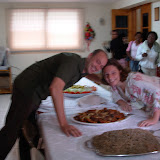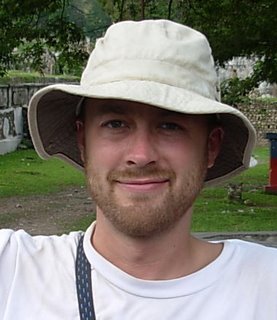As I mentioned in my most recent post, my birthday was on October 31st, and I was lucky enough to have a couple parties in my name, both of which were wonderful. But the best party, without a doubt, was held on the weekend after. I hosted a joint birthday party along with three women who are working at GHESKIO, an AIDS clinic and research facility in Port-au-Prince.
To prepare for the big day, I got up at 4:30 am to ride my Honda down to the MCC guesthouse where we were to hold the party. There I met up with Joseph, the MCC chauffeur, and Saul, the guardian who lives there on the property with his family. We took off in the pickup towards La Saline, the number one place in Port-au-Prince to purchase a live goat on Saturday mornings.
I stayed in the car during the actual negotiation and purchase so as not to double the price. Here’s a picture of Saul and Joseph returning with their find. I snapped it through the rear-view mirror of the pickup.

After that, we picked up a hundred oranges and passionfruit, spices for the goat, a giant sack of charcoal, a pile of avocados, bunches of plantains, a couple flats of soda, and plenty of other things that I can't even remember now.
Let me explain how parties work in Haiti. If you throw a party, it is assumed that you will provide food - including some kind of meat - along with rice, beans, and a bevy of side dishes and a plethora of desserts. A wide assortment of soft drinks must be available. Most occasions also provide a healthy supply of Prestige, the national beer. And believe me, this is the bare minimum. Asking invitees to pay anything is a faux pas most grave. When I invited people in my office to the party a couple days ahead of time, they got very excited, and then got down to business telling me how not to blow it. I heard stories about foreigners living in Haiti who threw parties where there wasn't enough of this or that or big events where people were asked to chip in at the door. My coworkers were slapping each others backs, laughing hysterically at the thought of it.
So, does it seem like the expectations are a little high for hosts and hostesses in the poorest country of the Americas? Yes, they are. Ridiculously so. People go absolutely broke and into debt all the time just trying to fulfill their social obligations. The other option is to have friends over just for drinks and dessert or maybe just for some rice and chicken, but this requires you to insist at every opportunity that you are not throwing a party - it's just a little get-together.
As unfortunate as that is, it's great to go to a party knowing that you'll be well taken care of. But for our own party, we tried to lower the expectations a bit, reminding people that it was just us ignorant blans throwing it. The party was going to cost plenty already, and we were all on pretty tight budgets. We let people know we wouldn't be providing drinks. Still, we wanted to go for it and throw a party that was a step above the chips-and-salsa hangouts that we are used to back home. So we decided to kill and barbecue a goat.
I'll be merciful with the pictures from that whole process. I'll just show you a video of just before the deed was done...
...and what the goat looked like about an hour later.

As you can imagine, goats aren't very meaty. This one cost us about $30. A female. We could have gotten a male with more meat for about $45. And $60 would have bought us a strapping "chatre" or neutered goat, which is the meatiest of all.
For the slaughter, they cut the jugular while keeping the windpipe intact so that the goat would stay alive long enough to pump out as much blood as possible. After this rather excruciating display, Joseph went and pulled a long-stemmed papaya leaf off a tree. He removed the leaf and inserted one end of the two-foot long stem into a slit cut into one of the goat's rear ankles. He started blowing, and the goat's fur began separating from the muscle. The bubble grew and grew until the goat became an inflated goat. The ankle was tied off and the goat hung from a tree for slaughter. In about fifteen minutes, using only a machete and a kitchen knife, they had a bucket of organs and a bowl of meat.
I didn't stick around for the rest of the process, but it involved thoroughly washing each morsel of meat with sour oranges. This tenderizes the meat and removes that gamey, goaty smell and flavor. Then the morsels are marinated for hours in a sauce that includes a long list of spices, the only one of which I remember is garlic. Eventually, the goat is roasted over coals, in what they call buccaneer style. The result is a big plate of tender, delicious and flavorful meat. Unfortunately, the big plate wasn't quite big enough to feed everyone there at the party. The birthday kids all went without, but most people got at least a few bites. Plus there was a mountain of rice and beans, crispy fried plantains, salad, and plenty of other food. Plus a few pitchers of fresh squeezed orange-passionfruit juice. Plus three birthday cakes and an artistic birthday jello, made by the husband of one of the birthday girls.
The party was a great success. Probably fifty or sixty people all told. Some photos:


And the birthday kids:

But I have to write now about what happened afterwards. One of my coworkers had come to the party with a birthday present for me. I put it down on a table in the kitchen while we continued to prepare some of the food. Later, as the last of us were leaving, I looked and saw the gift on the table, and decided I would pick it up the next day when I came to clean up the giant mess left from the party.
The next day, the gift wasn't there. I hoped there was an explanation. I looked at my house, just to be sure. I called everyone that might have known where it was. But the more I looked at the situation, the more it seemed to me that the gift was taken by Saul. Saul is my friend. He is a warm and cheerful man. Physically, he is somewhat imposing, which is thrown off by his surprisingly high voice.
I played through the facts over and over again. Saul was the only person who had been in the house during the time when the gift disappeared, except for a woman who is living in the guesthouse - another friend of mine - who wasn't able to make it to the party until later on, and went straight to bed anyways as she was exhausted from writing papers for her online graduate courses. It was either Saul or her that took it, and I immediately suspected Saul. How could I? Things have gone missing at the guesthouse before. One time, just a couple weeks after I arrived here, I lost some cash. I was sure that I had left in on my dresser. The same thing happened to a female colleague. From that time, I had always held a little suspicion of Saul. It seemed to me at the time that he was the only person who would have the access, or at least he would have the most access. The truth is, things just go missing a lot in Haiti. It happens to everyone who lives here long enough. It's a very poor country, and of course people steal. Most houses in Haiti don't have a simple nuclear family living inside. Most live with relatives or friends. And in big houses with guards and housekeepers, there are even more people. And there is therefore a steady stream of friends and visitors coming and going, hanging out and what not. The MCC guesthouse is no exception. This is what I was told when I mentioned back then that the money seemed to have been taken - that it was probably someone who slipped in unnoticed when there were a lot of people around. Or perhaps a friend of one of our Haitian support staff who was visiting, saw the money, and couldn't resist what would seem to them like a lot of cash.
I still don't know what happened to that money. If someone took it, I don't know who. And of course I could have lost it all on my own. I always assumed it was Saul, though I never felt like I could ask him directly. When the gift went missing, however, I felt like I had to say something. He is the guardian, and MCC trusts him to keep things from getting stolen. If he himself is stealing things, well, that's not acceptable. I started thinking about how to deal with it. The next day after the gift went missing, I was in the office for a meeting and I took the opportunity to ask Saul if he had seen it. I tried to phrase it in a way that would allow him to save face by saying that he had it, but only because he wanted to make sure that it was safe until he could give it to me in person.
So I explained the situation, and he said he clearly remembered seeing the gift, but that if I didn't have it then he had no idea who did. I was frustrated. I became even more convinced that it was him. I began thinking about how I would deal with the issue. Often in Haiti, when someone needs to approach someone else over a very sensitive issue, they will send a third party to talk for them. I decided to take this route. I spoke with Garly, our office administrator, who I like a lot and consider a very thoughtful person. At times I felt uncomfortable there as a white man telling a Haitian man that I thought another Haitian man - his friend - had stolen from me, and I wanted him to help me find out if it was true. I tried to lay out the situation as fairly as I could. I told him that if Saul had taken the gift, and he simply gave it back once confronted, nothing drastic would happen. But I had no idea what to expect from my emissary. I became very afraid of the possibility that it would turn into an ugly situation. That Saul would be fired. That he would be forced to find not only a new job, but a new house for his wife and three children. And yet another part of me felt that I had been violated. The episode was like an open wound in my mind that festered more each day. I wanted badly for it to be resolved.
One week after the party, I stopped by the guesthouse to pick up my mail. Garly was there along with Saul and Joseph. I wasn't expecting the confrontation to happen then, but before I knew it we were sitting down together around the dining room table. We talked around the issue. I never accused Saul directly, but everyone there, including Saul, knew that I suspected him.
Garly and Joseph calmly and carefully laid out the facts, and arrived at the only conclusion possible, which is that the gift must have been taken by either Saul or the woman who was living at the guesthouse who, alas, was not Haitian. I said that I would go talk to her and ask about it, but being convinced that she hadn't taken it, I said that I didn't know what to do if she said no. Faced with the real consequences, I said that if both she and Saul denied responsibility, we would just have to forget about it. But Joseph and Garly were insistent that we could not do that. That it was necessary for us to resolve the issue for people to feel secure in that house.
So I went upstairs to talk to my friend, the woman living there. I began to ask about the gift, trying not to sound accusatory in any way, and she quickly said, "Oh yeah, I have that, was that yours?"
My first reaction was a wave of relief. There would be no further confrontation with Saul. Then my friend started feeling extremely guilty. She had been exhausted that night, and she saw something she thought was leftover from the party, and assumed it didn't really belong to anyone. And I told her then, and honestly still believe, that I completely understand. I've lived in big houses before where people are always coming and going, and the idea of property gets blurry. I explained my relief that it was her and not Saul, and that I did not in any way consider her a thief. She began crying all the same. That felt horrible.
Then I went downstairs to clear things up with Saul. I went out into the yard and found him and Garly and Joseph. I quickly explained that the gift was upstairs and everything was okay. I looked at Saul, and began to tell him that I was sorry. Before all the words came out, he winced, and then began to cry, and then sob. He staggered towards the door as Garly and Joseph moved to stop him. They held him and tried to calm him and explain why it was necessary to do this, and why it wasn't my fault. Joseph wisely said that we had to take this kind of thing head on because, "se Ayisyen nou ye": what we are is Haitians. He acknowledged in these few words, that being Haitian meant dealing with these kinds of accusations - and that overcoming these perceptions could only be done with fearless transparency. But Saul just stopped and said yes, while that may be true, he always felt that I was accusing him. And he continued to cry.
He was right. I always accused him. He could barely eat during the prior week. To be accused of stealing in Haiti is a very big deal. Thieves in the marketplace are sometimes beaten to death. And for Saul, to be accused by a white man, someone he considered a friend, was more painful than I can imagine. I'll never know what it feels to be judged like that. It was prejudice pure and simple, and prejudice hurts. I could probably spend the next ten years here and not see another Haitian man cry. It's very rare. But I saw it that day because of the emotional violence I had inflicted on this kind man.
I looked at Saul and it dawned on me just what I had done. I began to cry as well. Immediately he embraced me and told me that everything was fine, and that I shouldn't worry about it.
I couldn't stay at the house, I had to leave. I went home and didn't really go out much for the rest of the weekend. I kept playing over the events in my mind, wondering how I could be so wrong, so presumptuous. I felt like a monster. The comforts were few and small. I called Garly to tell him that I was having a very hard time with it, and he assured me that he too had thought it was most likely Saul who took the gift. Still, I though, how much of that was due to the way I explained and interpreted the whole affair from the beginning?
I went back to the house a couple days later, just to tell Saul that I still felt awful, and that I didn't deserve his forgiveness, and that I would be marked for the rest of my life with the lesson I learned there. Again the tears flowed. He just smiled and put his hand on my shoulder and that said it all.
I know this is a very personal thing to write on my blog. I was reading Geez magazine (if you're unfamiliar, check out www.geezmagazine.org) and I came across a quote that struck me. An activist named Sherene Razack "observes that white, privileged and respectable identity builds itself by being able to enter places of degeneracy and come out unscathed, willing and ready to tell the tale." I saw myself in this description, and I regret that. I do want to keep writing about my experiences here. Haiti has a tale to tell that's worth hearing. But not for the sheer thrill of it. It's important to hear because it reflects back on all of us who live lives of comfort and convenience, and who never have to suffer injustice and racism the way that people here do. I don't want to seem unaffected by the reality here. I am affected. I am quite scathed. Haiti has exposed me to my own ugliness, and as much as I'm ashamed of that, I don't want to hide it and pretend that I'm invincible and righteous and intent on teaching the people of Haiti a thing or two. I'm just glad I have an excuse to be here for the time being.





















